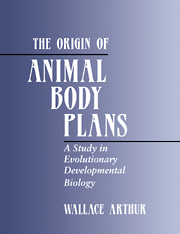Book contents
- Frontmatter
- Contents
- Preface
- Preface to the Paperback Edition
- 1 INTRODUCTION
- 2 WHAT IS A BODY PLAN?
- 3 PATTERNS OF BODY PLAN ORIGINS
- 4 EVOLUTIONARY DEVELOPMENTAL BIOLOGY
- 5 DEVELOPMENTAL MECHANISMS: CELLS AND SIGNALS
- 6 DEVELOPMENTAL MECHANISMS: GENES
- 7 COMPARATIVE DEVELOPMENTAL GENETICS
- 8 GENE DUPLICATION AND MUTATION
- 9 THE SPREAD OF VARIANT ONTOGENIES IN POPULATIONS
- 10 CREATION VERSUS DESTRUCTION
- 11 ONTOGENY AND PHYLOGENY REVISITED
- 12 PROSPECT: EXPANDING THE SYNTHESIS
- References
- Index
Preface to the Paperback Edition
Published online by Cambridge University Press: 05 June 2012
- Frontmatter
- Contents
- Preface
- Preface to the Paperback Edition
- 1 INTRODUCTION
- 2 WHAT IS A BODY PLAN?
- 3 PATTERNS OF BODY PLAN ORIGINS
- 4 EVOLUTIONARY DEVELOPMENTAL BIOLOGY
- 5 DEVELOPMENTAL MECHANISMS: CELLS AND SIGNALS
- 6 DEVELOPMENTAL MECHANISMS: GENES
- 7 COMPARATIVE DEVELOPMENTAL GENETICS
- 8 GENE DUPLICATION AND MUTATION
- 9 THE SPREAD OF VARIANT ONTOGENIES IN POPULATIONS
- 10 CREATION VERSUS DESTRUCTION
- 11 ONTOGENY AND PHYLOGENY REVISITED
- 12 PROSPECT: EXPANDING THE SYNTHESIS
- References
- Index
Summary
Two years have elapsed since publication of the hardback edition, and many significant advances have been made during this period. I mention several of these below, ordered according to the first chapter on which they impact.
Molecular studies of the age of the animal kingdom, including attempts to date major divergences (e.g. protostome-deuterostome) have continued to proliferate (Ayala et al. 1998; Bromham et al. 1998; Wang et al. 1999). These have produced very varied estimates, and metazoan origins may yet lie anywhere between about 600 and 1200 my ago, as indicated in Chapters 1 and 3, or indeed somewhat earlier. Most of the molecular studies favor an early metazoan origin. However, the continuing lack of clear fossil evidence of undisputed metazoans in pre-Vendian times is still a powerful argument for a late origin.
Von Baer's proposed pattern of increasing phenotypic divergence through embryogenesis (Chapters 2, 4) continues to be challenged, yet continues to survive, albeit in modified form and in restricted numbers of taxa. The latest challenge has come from Richardson et al. (1997), who show that Haeckel's drawings, which ironically have provided part of the evidence for von Baer's ‘laws’, are somewhat inaccurate, and tend to gloss over some early embryonic differences. This acts to diminish, but not to eliminate, von Baerian divergence (see Chapters 2, 4 and 11).
- Type
- Chapter
- Information
- The Origin of Animal Body PlansA Study in Evolutionary Developmental Biology, pp. xiii - xviPublisher: Cambridge University PressPrint publication year: 1997



